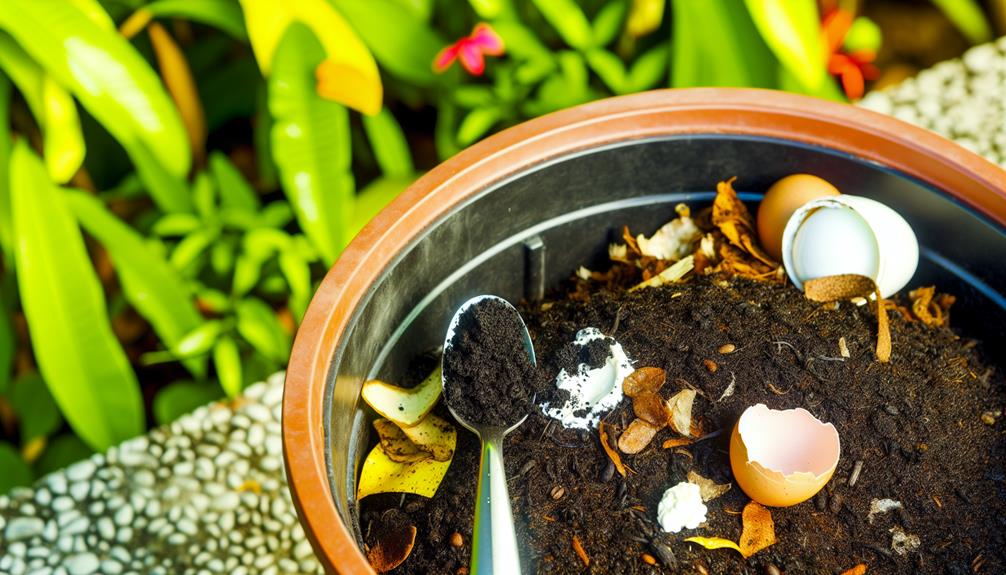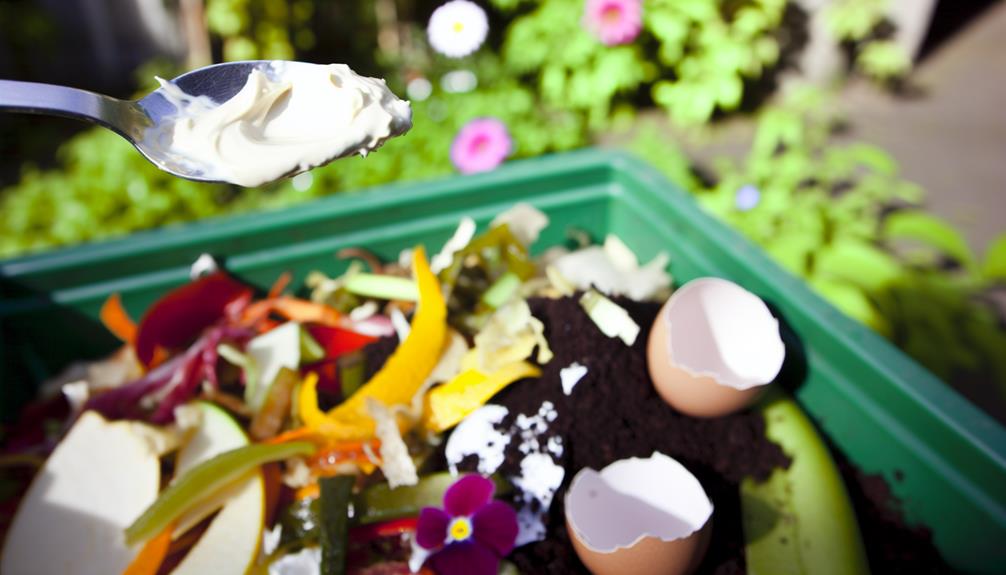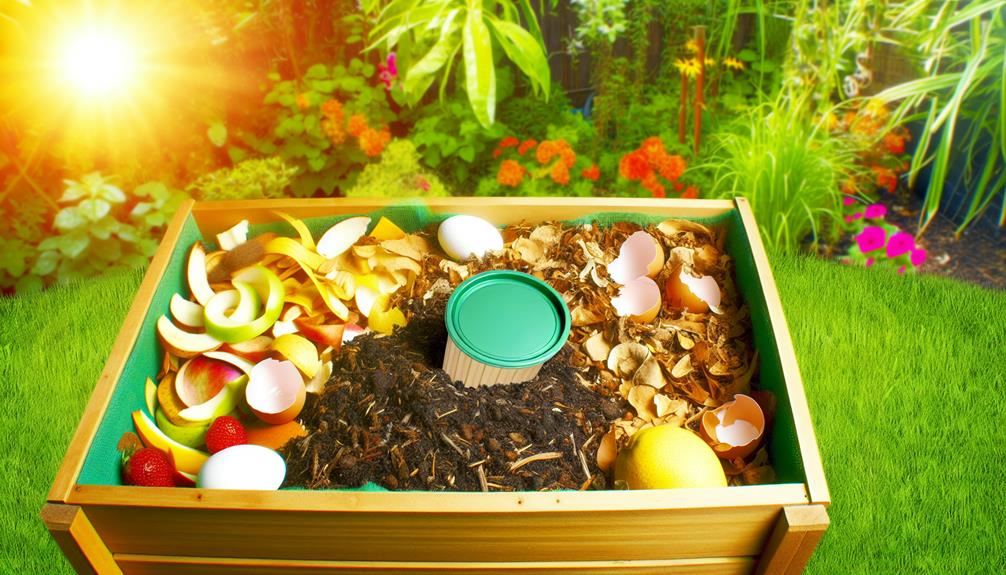

You can compost sour cream, but it requires some care. Dairy products like sour cream can attract pests, produce odors, and break down slowly due to their fat content. To compost it effectively, mix it well with carbon-rich materials like dry leaves or cardboard. This helps balance the moisture and absorbs odors.
Regularly turn and aerate your compost to speed up the process and prevent pests. If you apply these tips, your sour cream should break down efficiently alongside other organic waste. Keep exploring more guidelines to guarantee successful composting.
To start composting, you’ll need to understand how organic waste breaks down and what ingredients are ideal.
Focus on a mix of greens and browns, such as vegetable scraps and dried leaves.
Follow the composting process steps carefully to guarantee efficient decomposition and nutrient-rich compost.
When starting a compost pile, understanding the basics of organic waste breakdown is essential for success. Composting transforms organic matter into nutrient-rich soil through microbial activity.
Here’s how you can guarantee effective breakdown:
A successful compost pile relies on a mix of diverse ingredients that cater to the needs of decomposing microbes. You’ll want to balance “greens” and “browns.” Greens are nitrogen-rich and include kitchen scraps like vegetable peels and coffee grounds. Browns are carbon-rich and include items like dry leaves and cardboard.
Including fermented foods like sour cream can add beneficial bacteria to your compost, aiding the breakdown process. However, balance is key. Too much dairy can create a smelly compost pile and attract pests. Start small and mix it well with other ingredients.
Here’s a handy table to guide you:
| Ingredient Type | Examples |
|---|---|
| Greens | Vegetable scraps, coffee grounds |
| Browns | Dry leaves, cardboard |
| Fermented Foods | Sour cream, yogurt |
Understanding the origins of your ingredients is important. For instance, knowing that your sour cream comes from organic sources ensures that you’re not introducing harmful chemicals into your compost.
Start by selecting a suitable location for your compost pile, ideally a well-drained spot with partial sunlight. This guarantees your pile gets enough warmth without drying out.
Next, gather your compost materials, including your sour cream, and follow these steps:
Consistency is key. Keep an eye on the moisture level, aiming for a texture similar to a wrung-out sponge. Don’t forget to chop larger items into smaller pieces to help them break down faster.
Also Read: Can You Compost Cabbage?
When you add dairy products like sour cream to your compost, you might attract unwanted pests and slow down the decomposition process.

It’s important to reconsider composting dairy directly because it can create imbalances.
Instead, explore alternative compost methods to handle dairy waste more effectively.
Composting sour cream can attract unwanted pests like rodents and flies, creating a nuisance in your compost pile. When you add dairy products like sour cream to your compost, it often leads to foul odors, which can be a beacon for pests.
Here’s why it’s a problem:
Adding sour cream to your compost pile noticeably slows down the decomposition process. Dairy products like sour cream disrupt the balance of your compost because they are rich in fats and proteins, which are not as easily broken down by the microorganisms responsible for composting. This can lead to slower microbial activity and affect temperature regulation within the pile.
Here’s a quick overview of how sour cream impacts your compost:
| Impact | Description |
|---|---|
| Microbial Activity | Slows down as microbes struggle to break down fats and proteins. |
| Temperature | Decreases, as fats and proteins don’t generate the same heat as plant matter. |
| Odor | Increases, leading to a stronger, unpleasant smell. |
| Decomposition Speed | Reduced, making the composting process longer. |
| Attracts Pests | Higher likelihood of attracting rodents and flies. |
To maintain a healthy compost pile, you want to make sure that microbial activity remains high and the temperature is regulated properly. Including sour cream can disrupt this balance, causing more harm than good.
Stick to composting plant-based materials and avoid dairy products to keep your compost pile functioning efficiently. This way, you can create a thriving compost community that benefits your garden and the environment.
Exploring alternative compost methods can help you manage dairy products like sour cream more effectively. Standard composting mightn’t always be the best route due to the slow decomposition and potential odor issues with dairy. However, alternative methods like vermicomposting techniques and bokashi composting can offer great solutions.
Vermicomposting Techniques: This method uses worms to break down organic matter efficiently. While traditional vermicomposting systems might struggle with dairy, small amounts of sour cream can be introduced gradually. Make sure the worms have plenty of bedding material to balance the moisture content.
Bokashi Composting: This anaerobic process involves fermenting your kitchen scraps, including dairy. You can add sour cream to your bokashi bin, where it will break down without attracting pests or producing foul odors. After fermentation, the pre-compost can be buried in the soil to complete decomposition.
Trench Composting: If you prefer a simpler method, dig a trench in your garden and bury small amounts of sour cream with other organic waste. Cover it with soil to minimize odor and pest issues. This method works well for those who’ve ample garden space.
Also Read: Can You Compost Bones?
One major challenge with composting sour cream is its tendency to attract pests and produce foul odors. When sour cream breaks down, it releases strong smells that can draw unwanted animals like rats, raccoons, and insects to your compost pile. To prevent spoilage and manage these issues, you need to focus on proper storage conditions before adding sour cream to compost.
Keep sour cream refrigerated and use it before it spoils. If it’s already expired, store it in a sealed container until you’re ready to compost.
Another issue is the high moisture content in sour cream. This can make your compost pile too wet, leading to poor aeration and slower decomposition. To counter this, balance the moisture by adding dry, carbon-rich materials like leaves, straw, or paper. These help absorb excess moisture and improve airflow.
Additionally, sour cream’s fat content can slow down composting. Fats take longer to break down and can create an imbalance in your compost’s nutrient profile. To manage this, mix sour cream with a variety of other compostable materials to maintain a balanced and efficient composting process.
By composting sour cream, you enrich your soil with essential nutrients, making it more fertile for gardening.
You’ll also reduce the amount of waste sent to landfills, contributing to a cleaner environment.
In addition, composting promotes sustainable practices, helping you maintain an eco-friendly lifestyle.
Composting sour cream enriches soil quality by adding essential nutrients and beneficial microorganisms. When you include sour cream in your compost pile, you’re promoting microbial activity, which is important for healthy soil.
These microbes break down organic matter, releasing nutrients that plants can absorb more easily. This process, known as nutrient cycling, guarantees that your soil remains fertile and productive.
Here are three key benefits you’ll notice:
Including sour cream in your compost pile greatly reduces landfill waste by diverting organic material away from trash bins. By composting, you help in landfill reduction, which is vital for effective waste management.
When organic materials like sour cream end up in landfills, they decompose anaerobically, producing methane, a potent greenhouse gas. Instead, by incorporating sour cream into your compost, you contribute to a more environmentally friendly decomposition process.
To manage your compost effectively, add sour cream in moderation and mix it well with other compostable materials like leaves, grass clippings, and vegetable scraps. This balance ensures that your compost pile remains healthy and breaks down efficiently.
Remember, composting isn’t just about reducing waste but also about creating a sense of community responsibility.
When you compost, you’re not only practicing good waste management but also setting an example for your community. Sharing your composting efforts with friends and neighbors can encourage them to adopt similar practices, amplifying the benefits of landfill reduction.
Incorporating composting into your routine not only enriches the soil but also fosters sustainable practices that benefit the environment. By composting sour cream and other organic matter, you’re actively participating in sustainable gardening and developing eco-conscious habits that contribute to a healthier planet.
Here are three key benefits of composting:
While adding sour cream to your compost might seem harmless, several potential issues could arise if it’s not managed properly.
First, sour cream can cause a spoilage odor. Dairy products like sour cream decompose quickly, emitting a strong, unpleasant smell that can attract unwanted pests to your compost pile. This smell can become a nuisance, especially in community gardens or shared spaces.
Another concern is mold growth. Sour cream is prone to developing mold, which can spread throughout your compost. While some molds are harmless, others can be detrimental to your compost’s health and potentially harmful to you when you handle the compost.
Additionally, the high-fat content in sour cream can slow down the composting process. Fats take longer to break down than plant-based materials, which can disrupt the balance of your compost pile and delay the production of usable compost.
Also Read: Can You Compost Cat Feces?
To effectively manage sour cream in your compost, follow these important composting tips to mitigate potential issues. Ensuring compost safety and compost hygiene is vital to maintaining a healthy and productive compost pile.

If you’re not keen on composting sour cream, there are other eco-friendly ways to dispose of it. You can consider food donation, especially if the sour cream is unopened and within its expiration date. Many local food banks or shelters will gladly accept such donations. In this way, you’re contributing to the community and reducing food waste at the same time.
Another option is to use sour cream as animal feed. Many farm animals, such as pigs and chickens, can consume dairy products like sour cream in moderation. Reach out to local farmers or petting zoos to see if they can use your leftovers. This method makes sure that the sour cream doesn’t go to waste and supports local agriculture.
If the sour cream is still in good condition, consider getting creative in the kitchen. Use it in recipes like baked goods, sauces, or dips. You might be surprised at how versatile sour cream can be in cooking!
Now that you’ve explored alternatives to composting sour cream, let’s discuss how to effectively use the finished compost in your garden. Rich in nutrients and organic matter, finished compost serves as an excellent soil amendment. It improves nutrient distribution, enhances soil structure, and promotes healthy plant growth.
To make the most out of your compost, follow these steps:
Embracing eco-friendly practices in your gardening routine not only benefits your plants but also contributes positively to the environment. By integrating sustainable habits, you’ll foster a healthier ecosystem and inspire others in your community to do the same.
Start with simple recycling tips. Instead of discarding kitchen scraps, create a compost bin. This reduces landfill waste and enriches your soil with essential nutrients. Items like vegetable peels, coffee grounds, and even sour cream can be composted, provided they’re mixed well with other materials.
Next, consider plastic alternatives. Use biodegradable pots or repurpose old containers for planting. Avoid single-use plastics by investing in durable, reusable gardening tools. When shopping, bring your own bags and choose products with minimal packaging.
Incorporate water-saving techniques. Collect rainwater in barrels and use drip irrigation to minimize water waste. Mulching your garden beds helps retain moisture and reduces the need for frequent watering.
Yes, sour cream can attract pests to your compost pile. For effective pest prevention, avoid adding dairy products. They can also cause compost odor issues, making your composting efforts less enjoyable for the whole community.
To answer your question, sour cream’s decomposition rate in compost depends on microbial activity. Typically, it can take a few weeks to a couple of months. You’re contributing to a thriving compost community by adding diverse materials!
You can add expired sour cream to your compost, but be cautious. While it adds some nutrient value, it can also disrupt the microbial balance. Mix it well and balance with plenty of browns to avoid issues.
You should mix sour cream with other compost materials. Use dairy alternatives sparingly in your compost layering to balance moisture and avoid odors. Mixing helps create a thriving compost community, ensuring everyone feels connected to your composting efforts.
Yes, the fat content in sour cream can affect compost quality. It can disrupt nutrient balance and hinder microbial activity. Make sure you mix it well with other materials to maintain a healthy compost environment for everyone.
You can compost sour cream, but do it carefully. Dairy products, including sour cream, can attract pests and create odors.
Use small amounts and mix well with other compost materials. Consider adding browns like leaves or paper to balance moisture.
If you’re unsure, explore alternatives like bokashi composting.
By following these tips, you’ll safely turn sour cream into valuable compost, enriching your garden while practicing eco-friendly habits.
